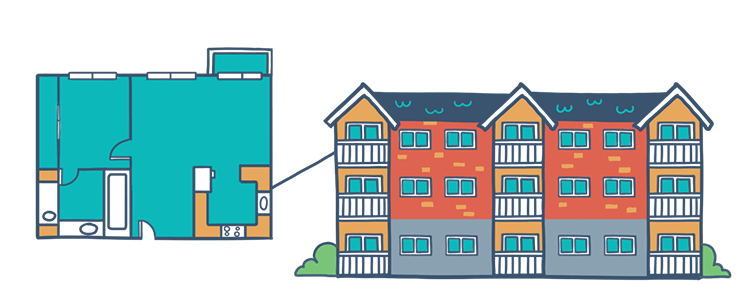FHA Condominium Loan

Condominium ownership is a non-conventional form of homeowning that is becoming more and more popular. Condominiums, or condos, are developments in which separate owners of individual units mutually own the common areas and facilities (such as pools and clubhouses). In an effort to encourage more Americans to take part in the housing market, the FHA insures condominium loans under Section 234(c) and encourages lenders to finance these purchases. Having these loans backed by the FHA is very important for low- and moderate-income renters who wish to avoid the risk of being displaced when their apartments are converted into condominiums.
Property Eligibility
Under the Section 234(c) program, the FHA insures a 30-year loan to purchase a unit in a condominium building. The building must contain at least four dwelling units and can be comprised of detached and semidetached units, row houses, walkups, or an elevator structure. The units must be used for residential purposes, not investment or business related. The development must also be "FHA-approved."
For a condominium project to be approved for an FHA-insured home loan, "the project must have been declared and exists in full compliance with applicable State law requirements of the jurisdiction in which the condominium project is located and with all other applicable laws and regulations."
If it is not an FHA-approved condominium project, it must be a project that meets the Single-Unit Approval requirements. The condominium project must also meet the requirements established by HUD through the SF Handbook 4000.1, including insurance coverage, financial condition, nature of title, the existence of any pending legal action or physical property condition, and other factors that may affect the viability or marketability of the project or its units.
If you are interested in purchasing a condo, the FHA updates its approved list of condominium projects regularly.

FHA Loan Articles
September 8, 2023Borrowers considering an FHA loan should be familiar with some basic loan terminology. These loans are popular among first-time homebuyers and those with lower credit scores because they often offer more flexible eligibility requirements and lower down payment options.
September 2, 2023You may have heard the terms co-borrower and cosigner in connection with your FHA loan process, but aren't sure about the distinction. Both a co-borrower and a cosigner can help a primary borrower qualify for a mortgage, but they have different roles and responsibilities.
August 27, 2023The Federal Housing Administration has specific credit requirements and guidelines for borrowers looking to buy or refinance homes with an FHA loan. In addition to what FHA guidelines state, lenders may have more stringent requirements that may vary from one lender to another.
August 23, 2023Mortgage APR (Annual Percentage Rate) and a loan's interest rate are two different things, although they are closely related. Understanding the difference is an important part of a borrower's analysis of the true cost of their mortgage.
August 19, 2023FHA refinance loans allow homeowners with existing FHA loans to refinance their mortgages. These loans are designed to help borrowers take advantage of lower interest rates, reduce their monthly mortgage payments, or access equity in their homes for various purposes.
August 14, 2023FHA loans typically require a minimum down payment of 3.5% of the purchase price of the home with the right credit score. This means that if you're buying a house for $240,000, you would need to make a down payment of at least $8,400.








